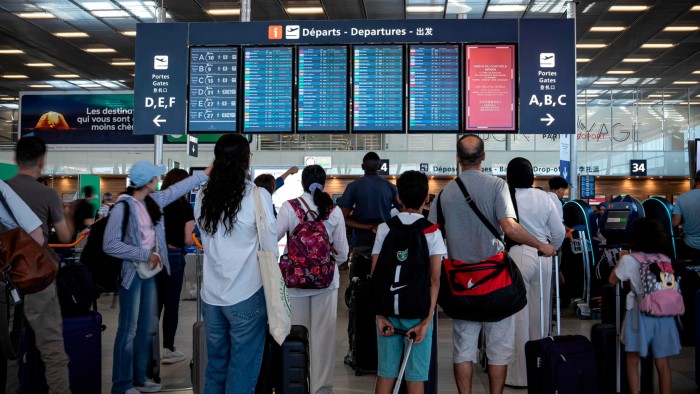The EU has warned that airline delays could be at their worst ever this summer as understaffed air traffic controllers battle strikes, wildfires and high demand.
EU officials said on Wednesday that the air traffic control system was operating at its limit because of a shortage of staff and demand for flying reaching new highs after the Covid-19 pandemic.
“Last year, we had the worst summer ever in terms of delays and cancellations. This year will be very similar,” a senior EU official said.
Around 37,000 flights fly in Europe on the busiest days in its airspace — the limit of what air traffic controllers can manage, the official added.
Eurocontrol, the air traffic control body, said in April that air traffic was already up 5 per cent in the year so far compared to the same period in 2024. Overall air traffic flow management delays were also up 5 per cent, it said.
“Lack of air traffic control capacity to cope with traffic demand is expected to cause high delays” in nine countries including France, Germany, Greece and Spain — some of the region’s most popular tourist hotspots.
Compounding the issue is industrial action, particularly in France. Two days of strikes by air traffic control staff at French airports over ageing equipment and staff shortages last week forced 4,000 flights across the bloc to be disrupted, said Eurocontrol. Thursday’s strike alone cost around €100 per minute, the organisation said.
Air France-KLM, which operates many flights out of Paris Charles de Gaulle airport, risked millions of euros of losses linked to the disruption, French transport minister Philippe Tabarot said.
Apostolos Tzitzikostas, the EU’s transport commissioner, said the bloc was operating with reduced airspace because of the war in Ukraine, which alongside the air control staff shortages “threaten to strain our aviation network and frustrate passengers”.
With airports “busier than ever”, “Europe cannot afford chaos in the skies,” he said.
Steve Heapy, chief executive of Jet2 told investors on Wednesday that the strikes had caused “a lot of worried customers” although the airline had continued flying.
Wildfires were also a leading problem. Europe is one of the regions most exposed to the effects of climate change, with wildfires forcing the temporary closure of Marseille airport on Tuesday. In Greece, tourist attractions such as the Acropolis have also been closed as a result of the extreme heat.
The senior official said that the effects of climate change were “a big concern. For the future, we see a lot more extreme weather events”, many of which were “quite dangerous for aviation”.
Another major cause of the delays is the lack of air traffic control staff. Tzitzikostas sent EU transport ministers a letter ahead of a meeting in June asking them to ensure that air traffic controllers “actually deliver the capacity they have formally promised and deploy air traffic controllers in the locations and in the time slots they are most needed”.
Officials said that while some pilots can gain their flying licences in one year, in some parts of Europe air traffic control staff have to undergo five years of training and that the commission was trying to work with aviation safety agencies to revise those rules.
Rafael Schvartzman, vice-president for Europe at the International Air Transport Association said the constantly increasing delays were “unacceptable”. “The gap between targets and reality is approaching fantasy levels, and there are no penalties for this continued abject failure,” he said.
Airlines also said that Brussels should complete the “Single European Sky”, an initiative enabling carriers flying within the bloc to take the most direct routes to their destinations, rather than forcing them to take diversions because of fragmented air traffic control.
“When you fly from London Stansted down to Cyprus you fly via a number of air points in the sky. It is not at all a straight line . . . but the EU has been frustratingly slow,” said a person familiar with the thinking at one large tour operator.



